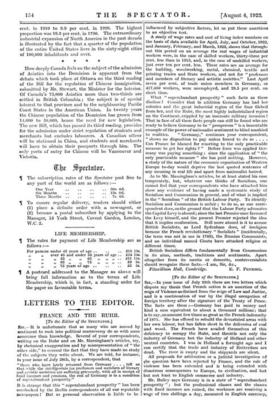LETTERS TO THE EDITOR.
FRANCE AND THE RUHR.
[To the Editor of the SPECTATOR.] Ern,—It is unfortunate that so many who are moved by sentiment to rush into political controversy do so with more assurance than knowledge. Several of your correspondents, writing on the Ruhr and on Mr. Massingham's articles, try, by rhetorical exaggeration and by misrepresentation of " the other side," to conceal the fact that they have made no study of the subjects they write about. We are told, for instance, in your issue of July 28th, by a correspondent, that " those who have lately returned from Germany . . . . tell us that while the intelligentsia (as professors and members of literary and artistic societies) are suffering grievously, with all in receipt of fixed incomes and pensions, the rest of Germany is in a condition of superabundant prosperity."
It is strange that this " superabundant prosperity " has been overlooked by the Berlin correspondents of all our reputable newspapers ! But as personal observation is liable to be
influenced by subjective factors, let us put these assertions to an objective test.
A study of wage rates and cost of living index numbers on the basis of data available for April, July, and October, 1922, and January, February, and March, 1923, shows that through-
out this period on an average the real wages of industrial workers were, in the case of skilled workers, thirty-three per
cent. less than in 1913, and, in the case of unskilled workers, just over ten per cent. less. These rates are an average for the building, woodworking, metal, chemical, textile and printing trades and State workers, and not for " professors and members of literary and artistic societies." Last April seven per cent. of trade union members in Germany, or 417,480 workers, were unemployed, and 28.5 per cent. on short time.
What " superabundant prosperity " such facts as these disclose Consider that in addition Germany has had her
colonies and the great industrial region of the Saar filched from her, and the Ruhr, the most highly industrialized region on the Continent, crippled by an insensate military invasion !
That in face of all these facts people can still be found who are ready to believe Germany to be " prosperous " is a lamentable example of the power of nationalist sentiment to blind mankind to realities. " Germany," continues your correspondent, " shows no disposition to pay unless forced to do so . . . . Can France be blamed for resorting to the only practicable measure to get her rights ? " Before force was applied Ger- many was paying something : since the application of " the only practicable measure " she has paid nothing. However, a study of the nature of the economic organization of Western Europe to-day would deprive the last quoted sentences of any meaning in real life and apart from nationalist hatred.
As to Mr. Massingham's articles, he at least stated his case temperately, but, whatever one thinks of Socialism, one cannot feel that your correspondents who have attacked him show any evidence of having made a systematic study of Socialism and Communism in general, and of what is implied in the " Socialism " of the British Labour Party. To identify Socialism and Communism is unfair ; to do so, as one corre- spondent does, on the ground that the Labour Party advocates the Capital Levy is absurd ; since the last Premier once favoured the Levy himself, and the present Premier rejected the idea that it implies confiscation. Still more absurd is it to accuse British Socialists, as Lord Sydenham does, of irreligion because the French revolutionary " Socialists " (incidentally, the term was not in use in 1789), the Russian Communists, and an individual named Clootz have attacked religion at different times.
British Socialism differs fundamentally from Communism in its aims, methods, traditions and sentiments. Apart altogether from its merits or demerits, controversialists should recognize these facts.—I am, Sir, &c., Fitzwilliam Hall, Cambridge. E. F. PENROSE.


































 Previous page
Previous page